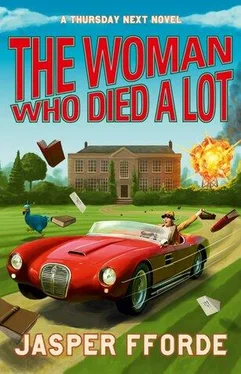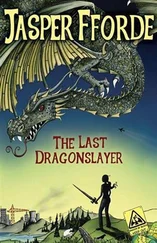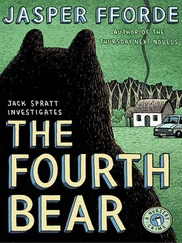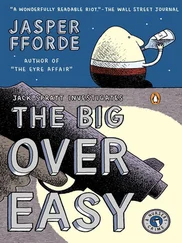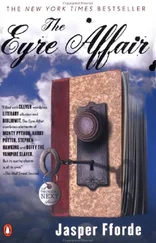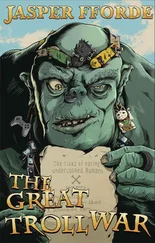But I’m getting ahead of myself. The events described here occurred during a busier-than-usual week in the late summer of 2004. A week that began with a trip into Swindon in order to find myself a job and ended with a pillar of cleansing fire descending from the heavens, a rethink on the Wessex Library Service operating budget, and my son shooting Gavin Watkins dead. The last one was a serious downer—especially for Gavin. It’s a long story, and with a few twists and turns that take a bit of figuring. What the hell. We’ll just run the story in real time as it happened and worry about the logic afterward. My name is Thursday Next. You’ll probably have heard of me as “the one who improved the ending of Jane Eyre,” but even if you haven’t, it doesn’t matter. You’ll know me well enough soon enough.
So there we were—my husband, Landen, and I, sitting in the comfort of a Skyrail car, gliding effortlessly above the North Wessex countryside on the Newbury-Hungerford-Swindon monorail. We’d boarded at Aldbourne, where we now lived, and the car was almost empty. We weren’t talking about Asteroid HR-6984, nor about the stupidity surplus or Landen’s latest book, Dogs Who Wonder Why Their Owners Think They Know When They Are Coming Home Because We Dogs Don’t Really but Agree It Might Appear as If We Do. We weren’t even talking about other issues of the day, such as pissed-off deities, Phoebe Smalls, the movie of Bonzo the Wonder Hound, Synthetic Thursdays or the ongoing “Brains kept alive in jars” ethical debate in New Splicer magazine. No, we were talking about our daughter Jenny and why I needed a tattoo to remind me she was somewhat less than I imagined, or indeed every bit as I imagined.
“I never thought I’d get a second,” I said, staring at the scarlet rawness on the back of my hand.
“I’m amazed you even got the first,” said Landen.
“It was on a drunken night in Sevastopol,” I replied wistfully, “a week off the troopship and still without an ounce of combat experience or sense.”
“Happy days,” said Landen, “to have experienced the camaraderie before the loss.”
He gave me a half smile, and I knew precisely what he meant. Before the ziiip of a round heralded a near miss, the Crimea had seemed like nothing more than a bit of a lark.
“The brigade tattoo was one of those bonding moments,” I said, “like agreeing to box Corporal Dwight for a kilo of best beluga caviar.”
He chuckled.
“You were mad. Dwight was a serious bruiser.”
“I know that now, ” I replied, “but give me credit for the attempt.”
Lance Corporal Betty “Basher” Dwight remained unbeaten in twenty-seven kickboxing bouts, thirteen of them against men. She was to become a loyal companion and friend, but not beyond my eighteen months of active service. Basher stayed in the Crimea, and I don’t mean to open a bar or something.
That first tattoo had been inked the night of my fight with Dwight and had actually been quite useful. Clearly not that drunk, I’d asked the tattooist to add my blood and tissue grouping to the brigade motif, a simple act that had saved my life at least twice. The boxing bout was not so successful. I hit the canvas ten seconds into the third after a punishing couple of rounds—my nose is still a bit bent, even today—and the unit had to go without caviar on their blinis for a month.
My second tattoo was done only two weeks ago, just after I’d turned fifty-four. It was of a purely practical nature and, unlike the first, which was etched unobtrusively on my upper arm, was on the back of my hand for all to see, especially me. It was at my family’s request, too—an attempt to remind myself that my second daughter, Jenny, wasn’t real at all but a troublesome mindworm foisted on me by a vengeful adversary.
“Did it have to go on my hand?” I said to Landen as the Skyrail car docked at Clary-Lamarr Travelport, Swindon’s main hub.
“It has to be somewhere you’ll have a chance of seeing it. The constant reminding might help you get over her.”
I stared at it again in order to keep the thoughts in my head as long as possible. Now that we were talking about Jenny’s nonexistence, everything seemed fine, but I knew also that these moments were fleeting. In a few minutes, all knowledge of the mindworm would be gone and I’d be fretting over Jenny again. Where she was, how she was, and why the teachers called Landen when I came to school to pick her up.
“Do you think it will?”
“I’m hoping yes but thinking no,” replied Landen in a typically stoical manner. “The only person who can fix your Jenny problem is the person who infected you with the mindworm: Aornis.”
This might seem strange until you realize that Aornis is a mnemonomorph—someone who can manipulate memories. She could rob a bank and no one would remember she’d been there. Besides, trying to capture someone who can manipulate memories is like trying to sweep a partial vacuum into a bell jar using only a yard broom. But we could make inquiries about her, and that was another reason we were in Swindon.
I grunted resignedly and then, after a short and oddly treacly pause, wondered what I was grunting resignedly about.
We drifted down the escalators from the south entrance of Clary-Lamarr and stepped onto the large concourse outside, which was dominated by the thirty-foot-high bronze statue of Lola Vavoom. We had missed the rush hour, and only latecomers and shoppers were walking out of the travelport.
“What were we just talking about?” I asked.
“Stuff,” replied Landen vaguely, taking a deep breath. “You know, I’m not sure I’m going to get used to living out of town. To me, grass is simply a transitional phase for turning sunlight into milk.”
“You’re changing the subject,” I replied suspiciously.
“I do that sometimes.”
“You do, don’t you?”
But Landen was right. He wasn’t really a country dweller.
“After a few months, you’ll be wondering how you lived anywhere else.”
“Perhaps.”
We’d moved out of Swindon four months before, not long after I’d been discharged from the hospital. The main reason was that our daughter Tuesday needed more room to experiment, but an equally good reason was security. I had more enemies than was considered healthy for the peaceful family life I had half promised myself, and a country home was more easily defended— from enemies on either side of the printed page.
“I think the city council is taking the threat of a smiting a bit lightly, don’t you?” I asked, as aside from a few billboards outlining the possibility that the Almighty would lay the center of Swindon to waste in an all-consuming fire next Friday, little seemed to be going on.
“Joffy said the cathedral received a leaflet slipped under the west door,” murmured Landen. “It was called Vengeful Cleansing by a Wrathful Deity and You. ”
“Helpful?
“Not really. A few tips for a safe evacuation when the order is given—covering the windows with brown paper, hiding under tables, mumbling— that sort of thing. I’m not sure they’re taking the threat seriously.”
“It was serious enough for Oswestry,” I replied, recalling the first of the nine random smitings that had been undertaken around the globe by a clearly disgruntled deity, eager to show His wayward creations the error of their ways.
“Perhaps so, but that was the first time, and no one believed that it would happen. If they’d evacuated the town, all would have been fine and only the buildings destroyed.”
“I suppose so. Did they ever decide whether it was ethical for those turned to pillars of salt to be ground up for use as winter road grit?”
Читать дальше
